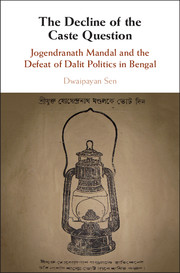
-
Select format
-
- Publisher:
- Cambridge University Press
- Publication date:
- July 2018
- July 2018
- ISBN:
- 9781108278348
- 9781108417761
- 9781108405706
- Dimensions:
- (228 x 152 mm)
- Weight & Pages:
- 0.62kg, 316 Pages
- Dimensions:
- (229 x 152 mm)
- Weight & Pages:
- 0.47kg, 318 Pages
You may already have access via personal or institutional login
Book description
This revisionist history of caste politics in twentieth-century Bengal argues that the decline of this form of political mobilization in the region was as much the result of coercion as of consent. It traces this process through the political career of Jogendranath Mandal, the leader of the Dalit movement in eastern India and a prominent figure in the history of India and Pakistan, over the transition of Partition and Independence. Utilising Mandal's private papers, this study reveals both the strength and achievements of his movement for Dalit recognition, as well as the major challenges and constraints he encountered. Departing from analyses that have stressed the role of integration, Dwaipayan Sen demonstrates how a wide range of coercions shaped the eventual defeat of Dalit politics in Bengal. The region's acclaimed 'castelessness' was born of the historical refusal of Mandal's struggle to pose the caste question.
Reviews
‘This pioneering and probing study of Jogendranath Mandal and his political predicament adds a completely new dimension to the history of Bengal. It brings out in detail some enduring caste-conflicts that marked the politics of the partition of the province and that have so far gone unacknowledged in mainstream histories of the subcontinent. An original and lasting contribution to modern South Asian history.’
Dipesh Chakrabarty - University of Chicago
‘With lucidity and passion, Sen recovers a profoundly important history of Bengal Dalit self-assertion between 1930s and 1960s. Focussing on a remarkable leader, it grows into the biography of a 'general category': provocatively arguing that Dalit politics was crushed by, and not integrated into, mainstream nationalism.’
Tanika Sarkar - Jawaharlal Nehru University, Delhi
‘This is a crucially important book that will help solve the mystery of the disappearance of the caste question from West Bengal's politics. Focusing on the career of Jogendranath Mandal, the foremost political leader of the Namasudra caste in the 1940s, Sen has brought to our attention much new archival material and raised some provocative questions.’
Partha Chatterjee - Columbia University, New York, and Centre for Studies in Social Sciences, Calcutta
Contents
Metrics
Full text views
Full text views help Loading metrics...
Loading metrics...
* Views captured on Cambridge Core between #date#. This data will be updated every 24 hours.
Usage data cannot currently be displayed.
Accessibility standard: Unknown
Why this information is here
This section outlines the accessibility features of this content - including support for screen readers, full keyboard navigation and high-contrast display options. This may not be relevant for you.
Accessibility Information
Accessibility compliance for the PDF of this book is currently unknown and may be updated in the future.


